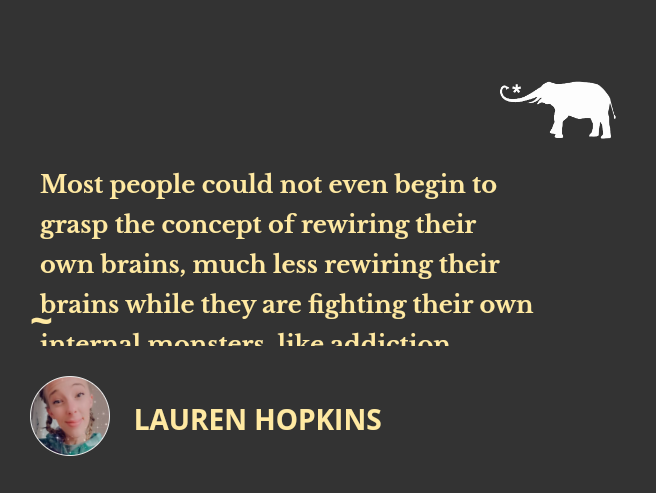Addiction has become an everyday battle for too many people in our country. It effects an addict’s quality of life, their careers, their close family, their personal relationships, and so much more. One of these greater impacts though, is the impact an addiction has on that person’s brain. This impact isn’t focused on only brain function, but on the process in which the brain rewires itself during an addiction, and afterwards during recovery. What makes a brain addicted to a substance, and how does one recover from this path that seems next to impossible to recover from? Why do people continue satisfying a momentary “craving” knowing that it is greatly effecting their general quality of life? What chemical imbalances happen in the brain during this time and why is it difficult for an addict to just stop? In this paper, I am going to focus on small piece of the addiction epidemic ravishing the society of our country today. That piece is going to be what happens to the brain of an addict, and what must happen for recovery to not only be possible, but successful.
So, what happens in the mind of an addict? Specifically, what happens to the brain of an addict? We’ve all seen what addicts look and act like after long time use, they don’t quite seem like they are living in our very current reality. Though their high is a relief or escape to them, it is sometimes painful for anyone else to watch, especially close family and friends. Addiction is running rampant in our society and even if we are not addicts ourselves, the likelihood that someone we hold close to us being an addict, is statistically normal. Addiction has become that, it has become normal, it has become expected, it is no longer surprising, and it is every day society to most people.
An addiction is a condition that results when a person ingests a substance or engages in an activity that can be pleasurable but the continuation of which becomes compulsive and interferes with ordinary responsibilities and concerns, such as work, relationships, or health (“Addiction | Psychology Today,” 2017). What would cause someone to disregard things that are so important to average people though? When an individual participates in taking any kind of drug, or participates in activity that is pleasurable to them, an extreme amount of dopamine is released into the brain. Dopamine produces feelings of pleasure when it is released into the brain’s reward center (Stangor, 2014, p.71) and that is the chemical that the brain is reacting to the most during these addictive behaviors. It is released in an extreme amount though, not like the regulated release people receive during a personal accomplishment or being around loved ones, but much like the excitement a child would receive on Christmas morning. Drugs and addictive behavior release ten times more dopamine than natural reward systems do (“Addiction and the Brain – How Drugs Affect the Brain,” n.d.). When the brain is accustomed to this amount of dopamine being released, it begins to rewire itself, using neuroplasticity, to balance itself out to accommodate these extra chemicals. Neuroplasticity is the brain’s ability to change its structure and function in response to experience or damage (Stangor, 2014. P.80). The brain is rewiring itself to suit the changes introduced during an addiction. The brain, simply put, is now learning to be addicted.
After a certain amount of time the brain has rewired itself to suit the extra amount of dopamine in its system. When this happens, the brain stops producing dopamine naturally because of the surplus that has now been introduced, and makes the addict feel as though they cannot feel good without continuing their addiction. When that chemical is no longer a variable in the brain’s normal function, the brain is again thrown off balance, and is fighting to maintain internal stability (“Addiction and the Brain – How Drugs Affect the Brain,” n.d.). This can lead to mental withdrawal symptoms such as anxiety and insomnia, or even physical withdrawal symptoms such as tremors and fevers. This is the beginning of recovery.
After enduring these withdrawal symptoms, there is still much to be done in the brain to maintain this recovery for an addict. Going through withdrawal symptoms is difficult, but rewiring the brain is just as difficult. Once an addict has gone through the initial withdrawal, there are still cravings, and still the need to satisfy that reward system in their brain that was so easily satisfied before by their addictive tendencies. The brain goes through yet another process of neuroplasticity, rewiring back to its original state without the surplus of dopamine in the brains reward system.
The difficulty of overcoming addiction is often judged and misunderstood by the general population that have either never gone through addiction, or have never admitted they are addicted. There are many people who have addictions such as shopping, smoking, or their work, that they do not acknowledge simply because it is not a drug. Almost everyone has a vice, it is when it becomes compulsive and necessary that it turns into an addiction. Recovery is not as easy as most would like to believe, and is a war within the addict themselves between their addicted mindset and their will to overcome their addiction. I, personally, applaud recovered addicts, it is not only difficult from a psychological standpoint, but from a physical standpoint a recovered addict has now rewired their brain two times. Most people could not even begin to grasp the concept of rewiring their own brains, much less rewiring their brains while they are fighting their own internal monsters, like addiction. The first time the brain is rewired to accompany a person’s addiction, isn’t necessarily as impressive, because it is the addiction leading the way for neuroplasticity to kick in. The second time an addicts brain is rewired is what is impressive to me, because it is their conscious decision to separate themselves from whatever compulsive behavior they are battling with. It is not easy, it is a painful, uncomfortable, and miserable process, but most recovered addicts that you would talk to would tell you that in the end, it was absolutely worth it. That, I feel, is misunderstood, and makes them stronger, mentally, than any average person, because they have fought a battle within themselves that too many have fought and lost, and they actually won.
Reference
Addiction | Psychology Today. (2017). Retrieved from https://www.psychologytoday.com/basics/addiction
Addiction and the Brain – How Drugs Affect the Brain. (2016, January 21). Retrieved September 03, 2017, from https://www.addictioncenter.com/addiction/addiction-brain/
Stangor, C. (2014). Introduction to Psychology. Washington, DC: Flat World Knowledge, Inc.

 Share on bsky
Share on bsky





Read 0 comments and reply